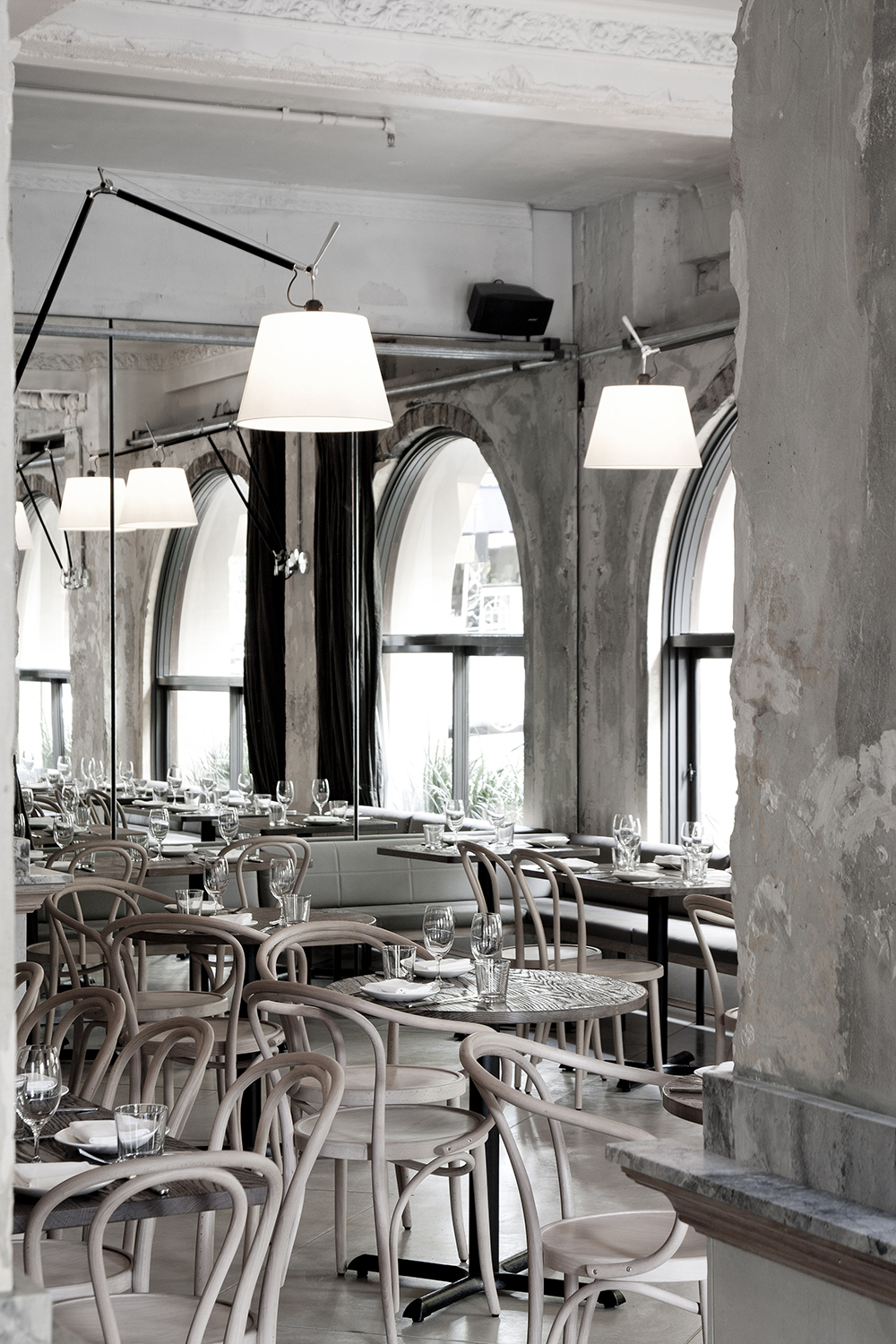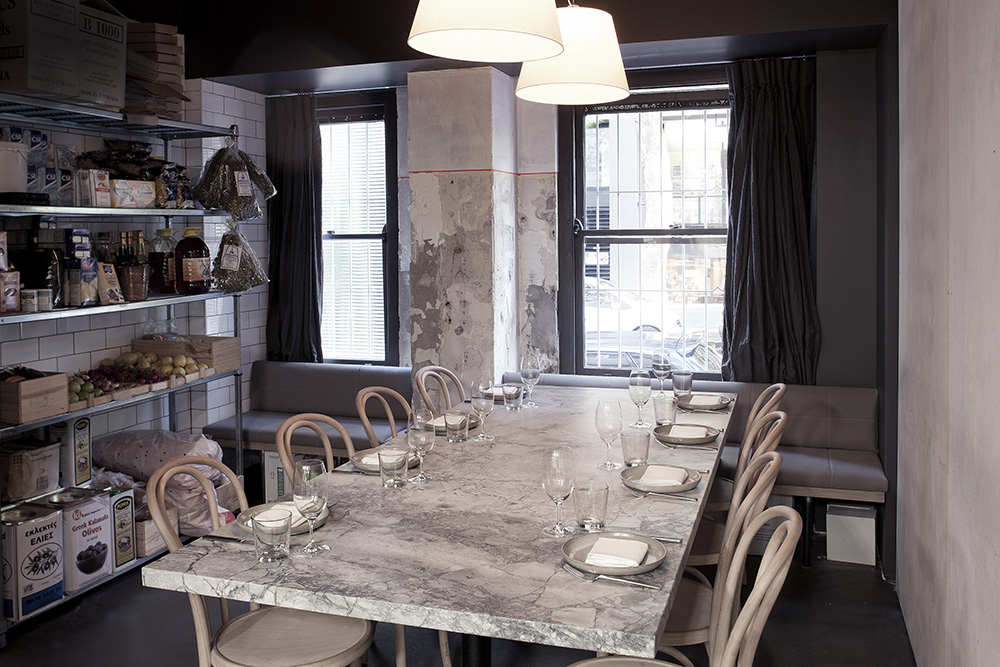THE EAGLE HAS LANDED
The Apollo:
4 Macleay Street,
Potts Point, Sydney, NSW (02) 8354 0888 or www.theapollo.com.au
Venue entrepreneur Sam Christie, chef Jonathan Barthelmess and architect George Livissianis are an illustrious trio. They also happen to be good friends: Barthelmess has known Christie and Livissianis since they were kids, and Christie and Livissianis worked together previously on the Thai warehouse institution Longrain/Shortgrain. The three of them also share a Greek heritage so naturally they share a knowledge of, and love for, good Greek food. It made sense that they would collaborate well, and it was only a matter of time before they did. The Apollo, their first joint venture, has been in the pipeline for years. “We’ve been talking about doing something together for a while,” Christie says. “We were looking at another site about two years ago, but unfortunately it fell through. Originally we were looking in the Surry Hills and Darlinghurst area, but when this place on Macleay Street in Potts Point came up, we jumped on it. That’s how it started. And away we went.”
Broadly speaking, The Apollo is an Australian Greek restaurant serving what Barthelmess describes as “polished village food”. But how it would look, and what it would feel like, didn’t crystallise until after demolition. “We had round table discussions about the food offering, service and the look and feel,” Livissianis says. “But once the space was locked in, things evolved. It wasn’t until the existing fitout was removed and the building carcass exposed that we new what we could utilise.” The existing shell had elements the team could expose and treat to be more suggestive of the Mediterranean — concrete columns, arched windows, and plaster detailing on the ceiling — and Livissianis decided the space should look Greek, but not overtly so. “I had a few ideas that related to island landscapes that were kind of dusty,” Livissianis says. “I didn’t want blue and white stripes and bowls full of lemons. I wanted to avoid that kind of stereotype.”
To that end, Livissianis created a highly textural interior. “We had all this existing façade to deal with. Some of the walls were wallpapered, some were painted and some were rendered. We wanted to rationalise these layers.” There are granite and brass finishes, and the colour palette is muted, with hints of aubergine and brown. There’s also a grey concrete sheet, which runs the length of one wall and wraps around the kitchen. “It would have been a bit too grunge and industrial if we didn’t clad the walls with a more refined, softer, smother finish. It’s a textural contrast to the cut back of the render on the façade walls. The sheeting also defines the new work, wrapping from the dining room, through to the bar and into the kitchen, so your experience of restaurant is continuous,” Livissianis says. “Once we stripped it all out, it kind of dictated that we clad it in something, because it was just all over the place,” Christie adds. Greek references include a potted olive tree and perched soft-glow lights with shades. “The actual shades remind me of my Greek grandmother,” Christie says. “It’s just one of those weird things: Greek grandmothers seem to have lampshades — you know, the ones with the pull chords? — everywhere in their houses.”
The other Greek reference is, of course, the name, and Christie’s Dad is credited with coming up with it. Apollo was the ancient Greek god of many things: light, music, poetry, healing and the business of predicting the future. Livissianis adds, “The Apollo sounds strong, and looks good written down.” And the name has a double meaning: it also references the iconic Apollo Theatre in Harlem, New York. “We play soul music here in honour of The Apollo,” Christie says. “We secured some Bose speakers through a mate, and we’ve put together some great playlists.”
The dining experience at The Apollo is relaxed. “It’s casual,” Barthelmess says. “It’s something you’re familiar with.” “I think it goes back to our experience of growing up with Greek food,” Livissianis says. “It’s share plates. You have it in a group; you have it with your family. Obviously Jonathan’s interpretation is much more beautiful and refined than what we had at home.” Patrons can choose from banquette and, after much deliberation, outdoor seating. “We had 86 objections to our proposal for an outdoor seating area,” Christie says. “They put some pretty stringent restrictions on us. We originally wanted to have 24 people out there. We ended up getting 16 in the day and 12 at night.”

The arm wrestle with the council over outdoor seating was the biggest hurdle that had to be overcome. But there were a couple of other setbacks. Construction spanned the Christmas period, which meant the process stalled for three weeks. “It was very swift apart from that,” Christie says. “All up, it took four and a half months. Because there was an existing restaurant here we didn’t have to go through much of a process for licensing or usage, and we’d worked with the builder before.” The ceiling also presented some challenges. “There were three layers of old ceiling,” Livissanis says. “There were massive ducts and sprinkler pipes and electrical cables and all sorts of things.” The process of bringing the dining chairs up to scratch is described by Livissanis as “a bonding experience”. Achieving what’s known as a “soap finish” — a look favoured by the Danes — required some good, old-fashioned elbow grease. “Basically you dilute some laundry soup — you know, some Lux-type stuff — with a little bit of water,” Christie explains. “You make a paste and you rub it over the raw timber. We had to do that seven times for every chair, and there are 60 chairs. We got some help from the backpackers across the road. We made them a bit of lunch in return.”
The Apollo opened five months ago, and its clientele is a real mixed bag. “We’re getting a lot of the older local patronage earlier in the evenings and then a younger crowd later on, especially towards the end of the week,” Christie says. “You can come as a family. You can come on a date. You can come with your mates. It’s very flexible in that sense, and that’s something that we talked about from the get-go. You have to be everything to everybody in this current financial situation. Part of it’s the fact that it’s the kind of food that we ourselves want to eat, and the kind of place we want to eat at. I think that gave us a lot of drive. That enjoyment then goes out to the customers.”
Story: Joanna Lowry


